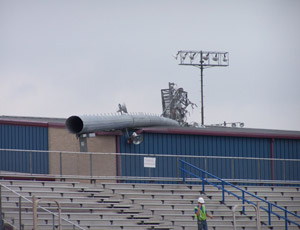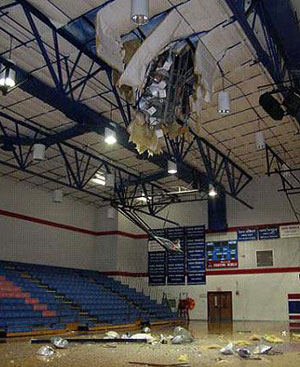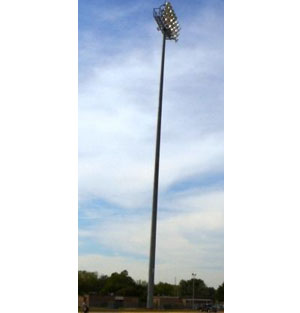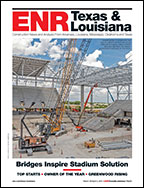Schools all over Texas have inspected stadium lighting poles manufactured by Whitco Co. LLP of Fort Worth after 11 confirmed incidents occurred involving the 70-ft or taller defective steel poles.



The U.S. Consumer Product Safety Commission first advised school officials and municipalities in August 2009 to inspect the Whitco poles and on July 6, 2010, issued a recall to repair notice for the 2,500 poles produced by the company, which entered bankruptcy in 2006.
As the commission learned about the existence of more affected poles, Alex Filipo, spokesperson for the CPSC, says the agency came out with the second warning to say, “Hey, we really mean it.”
The poles can fracture or crack, particularly at the base, and fall over, posing the risk of serious injury or death to patrons or bystanders from being hit or crushed, the CPSC says. The poles range in weight from 1 ton to 4 tons and range in height from 70 ft to 135 ft. The CPSC warns that the extent of pole damage cannot be determined by simply looking at it and needs an immediate evaluation by a qualified professional—an engineer or a Level II non-destructive testing technician. Non-destructive techniques such as magnetic particle inspection, dye penetrant or ultrasonic inspection techniques are recommended. The agency also suggests a design and stress assessment.
CPSC is urging facility owners to get a full inspection, including the lighting attached to and around the poles, Fillip says. “That extra step is really important. There have been some close calls. We don’t want people to die.”
Most of the incidents occurred in Texas, where the poles were installed at about 150 locations from 2000 to 2006. The poles also were installed at 600 other locations, such as parks, sports centers, seaside industrial ports and Army bases, around the United States. The CPSC is not aware of any injuries.
One incident occurred in March 2009, just before a soccer game at Jack C. Hays High School in Buda, Texas. A Whitco pole fell through the roof of the gymnasium. Hays Consolidated ISD in Kyle, Texas, removed the three remaining Whitco poles that same night and replaced them with poles from a different manufacturer, at a cost of about $500,000, says Julie Jerome Hays ISD spokesperson.
“The wind had been blowing for five or six days, and that contributed to the decision to pull down the other three,” Jerome says. “We called for a crane and worked through the night. The last pole was being removed at about 2 p.m. the next day.
An inspection of Hays’ Whitco poles, which were removed, showed a fissure in some of them at the base. The district also inspected every other pole in the district and found no issues with any of the poles from other manufacturers.
Liberty Christian School in Argyle, Texas, also had a Whitco pole fall. This time it was onto a practice field, says Dedra Brynn, executive director of advancement. As at Hays, school officials opted to remove all of the remaining Whitco poles. It has not replaced them.
Carrollton-Farmers Branch Independent School District in Carrollton, Texas, didn’t wait for one of its Whitco poles to fall down. The district hired an independent engineer to evaluate all of its light poles in the spring of 2010, according to a statement from spokesperson Angela Shelley. The engineer found deficiencies on five light poles. The district performed a temporary remediation and this month will make permanent repairs.
The Grapevine-Colleyville ISD has Whitco poles at three locations. Upon first learning about the problems, it conducted an in-house safety inspection of all light poles. Then it hired an outside engineering firm to assess the Whitco poles’ structural stability.
“While we are confident in the proactive measures we have already taken, we are evaluating the recent recall notice to determine if further action is needed to ensure the safety of our facilities for students, staff and guests,” says Megan Overman, public information officer for Grapevine-Colleyville ISD.
The University of Texas Arlington also has Whitco poles at its baseball field. University spokesperson Kristin Sullivan says the school acted early and inspected its poles last fall. It replaced two and added reinforcement with steel plates to other Whitco poles. All of the remedial work was completed by January.
The CSPC reports it has identified more than 50 Whitco poles that have not yet fallen. Inspections revealed fractures and/or cracks next to the weld that joins the pole to its base plate.
Because Whitco filed bankruptcy under Chapter 7 in 2006, the owners and taxpayers will have no recourse but to pay for the replacements or repairs. Certain company assets were acquired in 2006 by American Technologies Group Inc., West Caldwell, N.J., through a new, wholly owned subsidiary, Whitco Poles Inc., according to documents filed with the U.S. Securities and Exchange Commission.
CPSC’s July recall states it does not affect products from Whitco Poles Inc., also located in Fort Worth. Filip explains, “Whitco Poles was set up as a different corporation and different corporate structure. We completed an economic review to determine the legal pedigree of the company and its many iterations (Whitco LP) and predecessor. We traced the assets and liabilities through the various iterations but as part of the investigations, we cannot discuss further. Whitco Poles is not a manufacturer but rather a manufacturer representative for another pole company. They have no manufacturing operations on their site. Their parent sought to preserve the brand.”
Again, according to documents American Technologies Group filed with the SEC, it sold the assets to Whitco in 2008 to a subsidiary of Laurus Master Fund, a Cayman Islands corporation.


Post a comment to this article
Report Abusive Comment